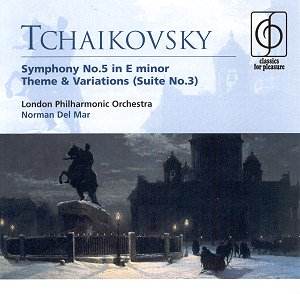As he began to sketch his fifth symphony, Tchaikovsky wrote
the following descriptive programme for the first movement:-
"Introduction. Complete resignation before
Fate, or - which is the same - before the inscrutable predestination
of Providence … Murmurs, doubts, plaints, reproaches against XXX.
Shall I surrender myself to the embrace of faith?"
Although his own tone poems had been a popular success,
Tchaikovsky still harbored doubts as to the ability of music to tell
a story. Nevertheless, his fifth symphony was to tell a profound personal
tale; one of aching self-doubt in the face of success, and one of crippling
self-loathing in the face of XXX. This anonymous monogram turns
up often in Tchaikovsky’s writings. At first, scholars believed it to
be an actual person who was the composer’s bane. Later it was determined
that this mysterious moniker was the pseudonym for his own homosexuality,
a trait with which he would never come to terms, and the discovery of
which has caused volumes of speculation as to the exact circumstances
of his untimely death in 1893.
During his lifetime, Tchaikovsky’s Suites for Orchestra
numbered amongst his most popular works. Although now eclipsed by his
later three symphonies, the suites are tours de force in orchestrational
technique. Sharing a love of the theme and variation genre with such
admired composers as Mozart, Beethoven and Brahms, this charming set
includes eleven variations and ends in a sparkling, energetic polonaise.
Norman Del Mar leads an energetic emotionally-charged
performance of the symphony. The London Philharmonic strings play with
a splendid lush tone, but are quite done in by some questionable woodwind
intonation and a trumpet section that is so blaring and out of tune
as to be almost painful. The achingly melancholy second movement gets
off to a fine start with some beautiful solo playing from the principal
horn. Equally lovely exchanges from the winds follow. Alas, this splendid
set-up is severely damaged by the trumpets that cannot seem to find
the center of the pitch, and blare away in a seeming attempt to peg
the engineer’s meters. The wistful, mysterious waltz is played elegantly.
The triumphant finale suffers from a rather indifferent amount of energy,
and from the aforementioned trumpets.
The Theme and Variations from the third orchestral
suite, recorded a year earlier, fare considerably better than the Symphony.
It is played with considerable aplomb, but this little filler is not
substantial enough to merit dropping the cash for the recording.
With so many truly fine performances of this music
in its catalogue, one wonders exactly why EMI found the need to reissue
such a mediocre performance. At mid-price, this disc might serve as
a repertoire filler, but one would be hard-pressed to find any desert
island qualities here. The twenty-plus year old analogue recordings
hold up fairly well, and the program notes are good, with just the right
mix of anecdote and analysis. While this disc has a redeeming quality
or two, there are better ways to spend your CD budget.
Kevin Sutton


